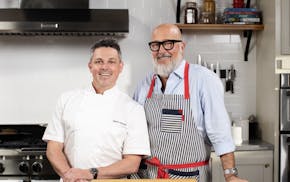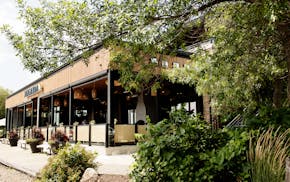Move over, cherry. It's spoon time!
After a week of on-and-off rain, on Friday morning crews from the Walker Art Center and Fine Art Finishes began the four-day process of priming and repainting the spoon from Claes Oldenburg and Coosje van Bruggen's "Spoonbridge and Cherry" in the Minneapolis Sculpture Garden.
While the 1,200-pound cherry journeyed to New York nearly four years ago to receive a fresh coat of red paint, the spoon hasn't had a makeover since 2017.
"The challenging part of this particular job is the scale, the size of it," said Alex Obney, owner of Fine Art Finishes. "We did literally two weeks of sanding. I just wanted to remove as much previous paint jobs as possible so we're not just building up more layers. We really went at it aggressively with the sanding, and fixed many cracks, so it was a lot of prep."
Paint jobs on outdoor public sculptures can be compared to cars.
"If you parked your car outside in the same place for seven or eight years, and full-bore UV in the Minnesota weather, where the temperature fluctuation can be 140 degrees over a calendar year, you would definitely see some wear and tear on it," said Joe King, director of collections and exhibitions management at the Walker Art Center.
While being painted, spoon stays attached to cherry and remains in the garden.
"It's the biggest part of the piece, obviously," said Robbie Frank, collections and exhibitions technician at the Walker Art Center.
Frank had been sanding the spoon for the past two weeks. The team noticed that the spoon had some hairline cracks and worked to smooth them out.
The actual re-painting process ― applying a primer and then the final coat of paint ― takes about four days.
The spoon repainting is divided into four parts: the top part of the handle, the back side of the spoon, the underside of the handle and the base of the spoon.
A scaffold had to be built around the bowl, tip and back of the spoon in order to reach it, since it lives just above the sculpture's small pond.
The spoon, which is painted a custom gray, has a semi-gloss finish, whereas a sculpture like German artist Katharina Fritsch's bright blue "Hahn/Cock," which lives nearby in the garden, has a matte finish.
Cass Koroma of Minneapolis wandered through the sculpture garden with her 3-year-old, Idris. They noticed the spoon on their way to visiting the blue chicken.
"It's always been my favorite, since I was a little kid," Koroma said. "Clearly there was no blue chicken when I was a little kid."
She remembered being in school and painting "Spoonbridge and Cherry." She shared that memory with her now-husband, whom she met in Sierra Leone when she was working there as a nurse.
"My husband is an immigrant and so that was always fun, a special thing for him to hear about places that he had never seen, and see pictures," she said.
When they moved to Minneapolis, he got to see in-person what she'd been telling him about.
In 1988, when "Spoonbridge and Cherry" landed in the Minneapolis Sculpture Garden, former Walker Art Center Director Martin Friedman gave the sculpture its own endowment fund to help care for it.
"As long as we keep maintaining it, it should be around forever, as far as we can see," King said.

How do you paint a giant spoon? At the Minneapolis Sculpture Garden, very carefully.

Semisonic cancels Minnesota Yacht Club and other summer gigs with bassist still on the mend

Meet the chefs feeding the Wolves and other Minnesota elite athletes

Wayzata's Mexican fine-dining escape getting a new look and a new menu

